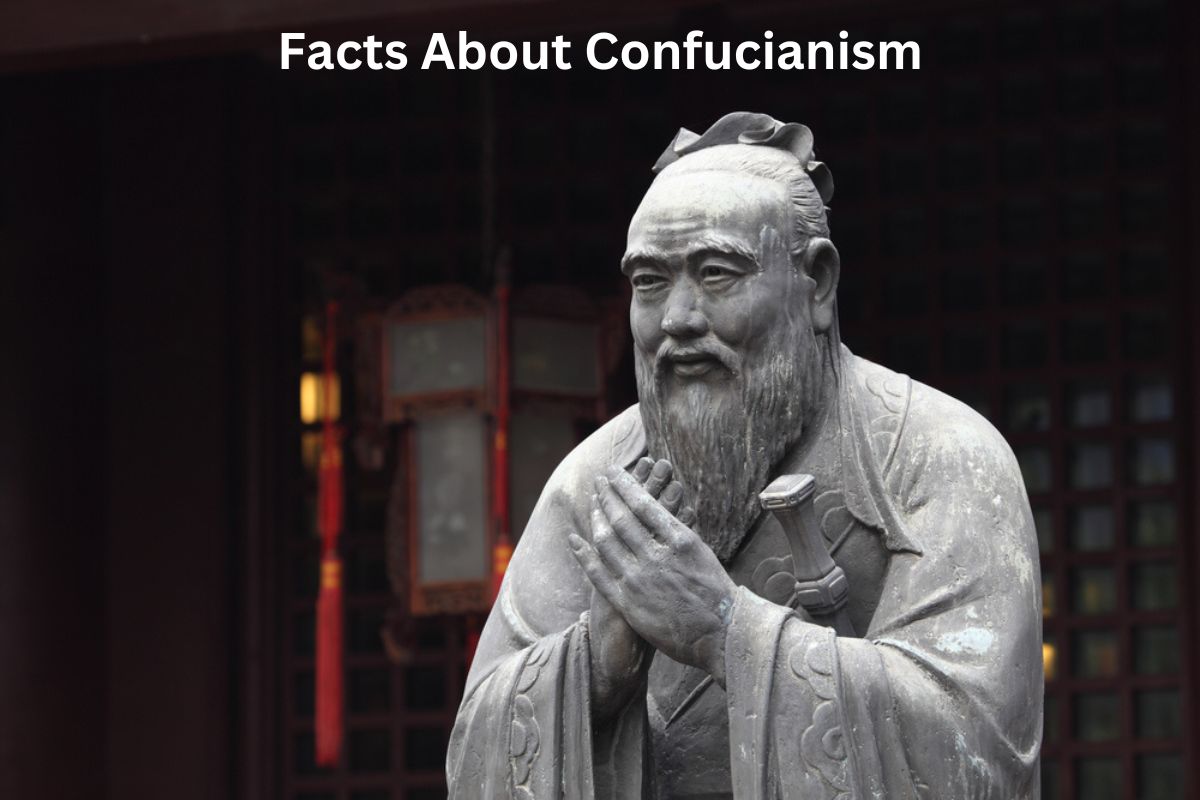Confucianism, a profound philosophical and ethical system founded by Confucius in ancient China, emphasizes the importance of proper conduct, moral principles, and social harmony.
Rooted in respect for family, society, and the self, Confucianism has shaped East Asian cultures, governance, and values for centuries.
Its teachings, compiled in the “Analects,” highlight virtues like filial piety, righteousness, and sincerity, fostering harmonious relationships and offering timeless insights into ethical living and societal order.
Confucianism Facts
1. Founded by Confucius, a Chinese philosopher, around 551-479 BCE
Confucianism was founded by Confucius (Kong Fuzi or Kongzi), a Chinese philosopher and educator who lived from 551 to 479 BCE during the Spring and Autumn period of Chinese history.
Also Read: Timeline of Confucius
Confucius developed a comprehensive ethical and philosophical system that focused on proper conduct, morality, and social harmony. His teachings laid the foundation for Confucianism and had a lasting impact on Chinese culture and beyond.
2. Emphasizes ethics, proper conduct, and moral principles
At the core of Confucianism is the emphasis on ethics and proper conduct. Confucius believed that ethical behavior and moral principles were essential for maintaining order in society.
He advocated for virtues such as benevolence (ren), righteousness (yi), propriety (li), wisdom (zhi), and fidelity (xin). These virtues guide individuals to act with integrity, respect, and compassion, contributing to harmonious relationships and a well-functioning society.
3. Filial piety is a core concept, stressing respect for parents and ancestors
Filial piety is a central concept in Confucianism, highlighting the importance of children’s respect and devotion to their parents and ancestors.
Confucius believed that showing reverence to one’s parents was not only a moral obligation but also a foundation for harmonious family and societal relationships.
This concept extended to ancestor worship, where individuals honored and paid respects to their deceased ancestors through rituals and offerings.
Filial piety and ancestor worship were seen as essential for maintaining social cohesion and honoring the continuity of family lineage.
4. Stipulates five essential relationships for societal harmony
Confucianism emphasizes the importance of proper conduct within key relationships to ensure social harmony. These relationships are often referred to as the “Five Relationships” and are as follows:
- Ruler and Subject: A just ruler should lead with benevolence, while subjects should be loyal and respectful.
- Parent and Child: Children are expected to show filial piety and respect to their parents, while parents should provide guidance and care.
- Husband and Wife: Spouses should uphold their respective roles with love, mutual support, and understanding.
- Older Sibling and Younger Sibling: Older siblings are to provide guidance and care, while younger siblings should show respect and obedience.
- Friend and Friend: Friends should uphold virtues like sincerity and loyalty in their interactions.
These relationships are characterized by mutual obligations and responsibilities, with the aim of creating a harmonious and orderly society.
5. “Rectification of Names” underscores using language accurately for order
Confucius emphasized the significance of using language accurately to maintain social order. The concept of the “Rectification of Names” underscores the idea that when words and terms are used correctly to describe roles, responsibilities, and relationships, society functions smoothly.
Inaccurate or deceptive language can lead to misunderstandings, confusion, and even societal breakdown. This idea underscores the importance of clear communication and the proper use of language to preserve harmony and integrity in relationships.
6. Confucius’ teachings compiled in the “Analects” or “Lunyu” book
The teachings and sayings of Confucius were compiled into a book known as the “Analects” or “Lunyu.”
This collection provides insights into Confucian philosophy, ethics, and teachings through a series of dialogues and anecdotes. The “Analects” offer guidance on various aspects of life, including morality, governance, education, and personal conduct.
The book has been a fundamental source for understanding Confucian thought and has had a profound influence on East Asian cultures, shaping ethical values and social norms for generations.
7. Influenced East Asian cultures like China, Korea, Japan, and Vietnam
Confucianism’s influence extends beyond its place of origin in China. It has profoundly impacted various East Asian cultures, including Korea, Japan, Vietnam, and beyond.
These cultures adopted and adapted Confucian values, ethics, and principles to their own contexts. Confucian ideas have shaped societal norms, educational systems, governance, and family structures in these countries, playing a crucial role in shaping their cultural identities.
8. Neo-Confucianism revived Confucian thought with added complexities
During the Song Dynasty (960-1279 CE), a new form of Confucianism known as Neo-Confucianism emerged. This development blended Confucian principles with elements of Buddhist and Daoist thought, resulting in a more complex philosophical system.
Neo-Confucianism emphasized metaphysical concepts, ethics, and the exploration of the relationship between the human and the cosmic. This movement had a significant impact on East Asian intellectual and cultural history, influencing various aspects of society.
9. Influenced China’s imperial examination system for civil service roles
Confucianism’s impact extended to governance and education through China’s imperial examination system.
The system, established during the Sui Dynasty (581-618 CE) and refined during subsequent dynasties, tested candidates’ knowledge of Confucian classics to select officials for the civil service.
This system had a profound impact on education and social mobility, making knowledge of Confucian texts crucial for advancement in government. The examination system lasted for centuries and influenced the educational systems of other East Asian countries as well.
10. Remains relevant today, impacting ethics, social harmony, and community roles
Confucianism’s enduring legacy lies in its continued relevance to modern society. Its emphasis on ethics, virtues, and social harmony continues to inspire discussions on personal conduct, societal order, and the role of individuals within the community.
Confucian principles have been integrated into contemporary debates on governance, education, business ethics, and interpersonal relationships. The philosophy’s focus on moral development and the cultivation of virtues remains valuable in navigating complex ethical dilemmas in the modern world.
